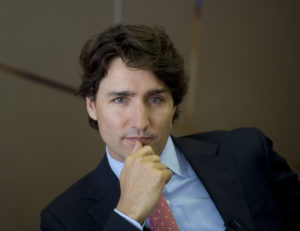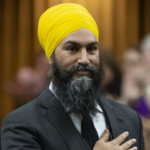October 19th, 2019
BURLINGTON, ON
It was the fall of 1972. I had cast my ballot in Orangeville, where I’d been working as purchasing agent, then hit the road for Ottawa. I’d been offered a better career job with the federal government.
On route one of our vehicles lost its electrical system just outside of Ottawa and we spent the night in a motel watching the election results that night. When the dust had settled I was left wondering whether I would still have a job. The Trudeau Liberals had lost their solid majority and had fallen into the uncertainty of minority government.
It had been a tough election. The over-riding issue during Pierre Trudeau’s first term was national unity. Trudeau had ended the immediate threat of separatism by introducing the War Measures Act, eliminating the terrorist organization, the FLQ. But Quebec’s quiet revolution would ensure that the demand for equality in the federation was far from over. So the Liberal government introduced official bilingualism, a concept at least as politically divisive as today’s carbon tax. Though fifty years later there is no longer any debate – it was the right thing to do.
Baby boomers had been pouring into the job market in record numbers, competing for scarce employment with still growing numbers of US draft dodgers arriving across the border. And the economy was recovering from the downturn of the late sixties. New grain markets had been opened up in China. Canadian cultural industries were on the move. Economic growth was projected to exceed by over 6% and the federal budget was close to being balanced. Indeed the land was strong.
So Pierre Trudeau somewhat arrogantly decided to run on his record rather than lay out a new vision for the future. But nobody was reading the fine print and that almost put an end to his vision of the just society. Voters are human after all. They want to know what’s in it for them.
So when Justin decided to run on his record he followed his father’s footsteps and polls show will end up much like his father did, if he is lucky. Andrew Scheer and Jagmeet Singh on the other hand have promised affordability, and suddenly their polls are swelling. Affordability? This is the number one issue for Canadians, more important than protecting our survival and the planet’s climate.
Yet Canada’s economy has never performed better – doesn’t that mean affordability? And this performance is largely the result of policies enacted by the Liberals after 2015, when the nation was teetering on the brink of a recession. Close to a million people, including 300,000 children have been lifted out of poverty, exceeding the government’s own projections and making this the lowest rate of poverty ever in Canada’s history.
Employment is at a record high and unemployment is the lowest since we started recording those numbers. Inflation is at historic low rates as are interest rates, and economic growth is among the best in the G7. Affordability? What else would one expect of a government? Well there is the matter of house prices and the still growing gap between the wealthy and the rest of us.
Housing prices are a function of demand and supply. But there are serious physical limits to increasing supply in our sprawling communities. Only Maxime Bernier’s People’s Party has a viable short term plan – reduce demand, cut off the number of immigrants coming here – the number of people looking for new housing. But his policy is simply dismissed as Donald Trumpian racism. And there may, indeed, be some of that among some of his candidates.
Humanity is almost never satiated, that is both our weakness and our strength. When the times are good as they are now, or as they were when PET arrogantly trotted out ‘The Land is Strong’, those who now have more want to know why they can’t have even more. Pierre Trudeau ended up losing his majority thanks in part to a brilliant campaign by the NDP’s David Lewis and his catchy refrain ‘Corporate Welfare Bums’. Why can’t we have some of theirs?
All of the opposition parties today are claiming to cut corporate welfare, though nobody seriously believes that would happen with the Tories. Even their lower class income tax cut will benefit the wealthy more than the middle class. And aren’t they promising to restore those unfair tax breaks for the business sector? And seriously, have we forgotten Stephen Harper and Doug Ford?
Jagmeet Singh may be a newbie in federal politics but he is a quick learner. He knows that if you want people on-side you simply tell them what they want to hear. As the third party he knows he won’t have to deliver at the end of the day. And look how Mr. Scheer’s false promises have been working for him. He started his campaign by telling everyone he would put more money in their pockets.
Singh has pulled a page out of David Lewis’ campaign book and is telling people he’ll make their lives better and more affordable by guillotining the heads off the rich and using them to feed the disadvantaged. Steal from the rich and give to the rest of us. Now isn’t that more appealing than just saying ‘The Land is Strong’?
 Ray Rivers writes regularly on both federal and provincial politics, applying his more than 25 years as a federal bureaucrat to his thinking. Rivers was once a candidate for provincial office in Burlington. He was the founder of the Burlington citizen committee on sustainability at a time when climate warming was a hotly debated subject. Ray has a post graduate degree in economics that he earned at the University of Ottawa. Tweet @rayzrivers
Ray Rivers writes regularly on both federal and provincial politics, applying his more than 25 years as a federal bureaucrat to his thinking. Rivers was once a candidate for provincial office in Burlington. He was the founder of the Burlington citizen committee on sustainability at a time when climate warming was a hotly debated subject. Ray has a post graduate degree in economics that he earned at the University of Ottawa. Tweet @rayzrivers
Background links:
Comedy or Cringe – !972 Budget –






















Wow! Talk about historical revisionism.
I remember 1972 too. It was the first election in which I voted. What I remember was an unemployment problem significantly higher than in 1968 exacerbated by the Liberals’ fiscal mIsmanagement and profligate spending. Contrary to what is stated in the article, there weren’t that many draft dodgers entering Canada. Official numbers peg it at between 20-60,000 between the early 1960’s and the end of the war in 1975. And who can forget the Liberals’ wonderful campaign slogan that year: “The land is strong”. To which the rejoinder was “What a pity the government isn’t!” And two years later PET got elected on another great slogan: “Price and wage controls simply don’t work”. Then eighteen months later the Liberals introduced price and wage controls to deal with runaway inflation after blind-siding his Finance Minister and doing a 180 pirouette. Talk about hypocrisy.
PET dodged a bullet on election night in 1972 squeaking out a two seat lead over the Tories. If the Liberals had been smart back then they would have demanded his head on a charger. When his son gets reduced to minority government status Monday night leaving behind a trail of defeated MPs, Cabinet Ministers and candidates the Grits have a unique opportunity to hit the reset button and call for his resignation. A leader with integrity would “man up”, admit his mistakes, take responsibility for his actions, resign and pass the torch. Sadly, integrity has indeed been in short supply throughout this campaign.
Ive got a feeling we will be looking at a Conservative majority, a lack of Conservative lawn signs
an increase in advance polling….Liberals getting bat crazy by the day….Marvel at the collective conciseness of the Canadian electorate.
Phillip – “Productivity in Canada averaged 87.87 Index Points from 1981 until 2019, reaching an all time high of 106.56 Index Points in the second quarter of 2017 and a record low of 67.27 Index Points in the third quarter of 1981.” Dr Rosenberg needs to update his prognostications. https://tradingeconomics.com/canada/productivity
Peter – “More than 9.5 million of the 14.1 million households in Canada owned their home in 2016, representing a homeownership rate of 67.8%. The rate of homeownership has been relatively stable over the last decade. In 2006, the rate was 68.4% and in 2011 it was 69.0%. In contrast, over the period 1991 to 2006, the homeownership rate rose from 62.6% to 68.4%.” https://www150.statcan.gc.ca/n1/daily-quotidien/171025/dq171025c-eng.htm
Jim – be careful, you have heard of Aladdin, right? Have a good evening watching the election results come in, no matter how you voted.
Justin heard that the Turks were having problems with to many Kurds. Justin emailed the Turkish President offering to take them off their hands since the they could be used in the growing trend for poutine in Canada.
The writer is looking through rose-tinted glasses; or at least spinning the narrative for partisan purposes.
Low unemployment is a mirage when many Canadians are barely making ends meet. Personal debt loads are rising and are now the highest in the G7 (Canadians Are Feeling the Debt Burn)
In most major Canadian cities, housing affordability is so bad, there are no neighbourhoods where a minimum-wage worker could comfortably afford an average-priced one-bedroom apartment (Affordable rental housing is nearly nonexistent for minimum-wage workers)
People have to travel vast distances to get to work. Hours-long daily commutes are no one’s definition of the good life.
The writer repeats the empty neo-liberal argument that housing is “a function of demand and supply”.
The former chief planner for Toronto argues that as housing has become hyper-commodified and “the fundamentals of the housing system are broken” as “new supply is being gobbled up by investors seeking a place to park capital. As a result, escalating prices have been delinked from how much people make, creating obstacles for the kinds of people who are essential to communities.” (Canada’s housing market – built on faulty assumptions – is falling down on affordability)
Not everyone is as content with the current state of affairs as the writer is.
The Trudeau government and Trudeau loyalists have become so enchanted with their own thoughts and ideas on how the world is, they’ve lost touch with the lived experience of most Canadians.
An excellent analysis
Ray, perhaps your analysis of the rosy picture you painted of Canada’s economy, particularly employment growth, under the Liberals requires further scrutiny. While it is true that the number of jobs created in Canada has approached 1 million which on its face is a notable achievement, is it due to Liberals policies? Certainly, the large deficits–far in excess of what the Liberals promised in 2015 have had a stimulative effect but at a significant long term cost–both in terms of rising interest expenditures but also the loss of future fiscal flexibility to deal with a looming global recession. David Rosenberg, chief economist at Gluskin-Sheff pins this at 80%–weak private investment in Canada, falling productivity levels do not bode well for Canada’s economic prospects, nor does the spectre of the USA-China trade disputes. And on this last point, you can’t deny much of the growth in the last 4 years has been the impact of the US economic boom and its spillover into Canada. And a further point which you omitted, since June 2018, the Ontario economy has added 272,000 of those jobs since the election of the Ford government.
The cause-effect relationship between employment growth and Liberal policy has been tenuous at best.
And Ray, your article seems to have totally omitted any discussion of ethics violations and corruption by the Trudeau government–not a small consideration even if Liberals like to pretend it didn’t happen.